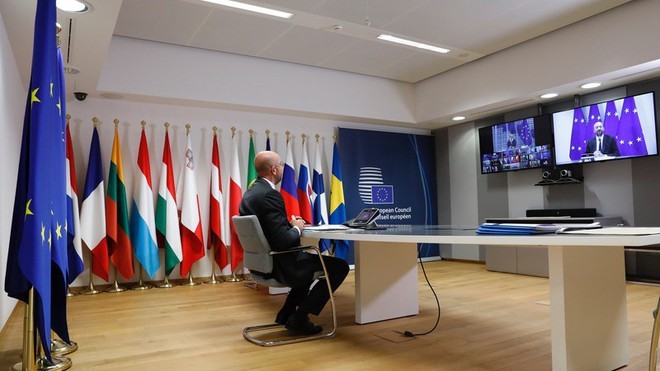(VOVWORLD) - A political crisis in Belarus has the world’s attention these days and there is a profound split within the European Union as to what should be done about it.
 EU leaders convene an online emergency meeting on Belarus crisis, August 19, 2020. (Photo: anninhthudo.vn) EU leaders convene an online emergency meeting on Belarus crisis, August 19, 2020. (Photo: anninhthudo.vn) |
The political crisis in Belarus began with a protest against the announced result of the August 9 presidential election, which had incumbent President Alexander Lukashenko winning a landslide victory. Shortly after the election result was announced, Russian President Vladimir Putin sent a congratulatory message to Lukashenko, reaffirming his commitment to promoting the strong alliance between Russia and Belarus. At the same time, EU and other Western countries voiced their support for the opposition's protest and threatened to impose harsh sanctions on the Belarus government.
The EU response
Many EU and US diplomats rejected the election result as having been rigged. European Commission President Ursula von der Leyen tweeted that sanctions will target "those who violated democratic values or abused human rights in Belarus." European Council President Charles Michel said the EC will soon impose sanctions on a “substantial number” of individuals responsible for violence, repression, and election fraud. 10 days after the election, EU leaders opened an emergency online conference to discuss the crisis in Belarus.
EU members, however, have expressed differing views, and the EU has been unable to agree on a unified sanctions policy.
Differences of opinion
Sources say the EU is making a list of 20 or more individuals who will have their assets frozen or be banned from travel because of their involvement in Belarus’s election mess. As of Monday, only Estonia, Latvia and Lithuania had banned Lukashenko and 29 other senior Belarusian officials from entering their country. The other 24 members EU members have made no official decision.
Germany and France want to find a diplomatic solution to the crisis. In a statement on August 20, French President Emmanuel Macron proposed that the EU act as a mediator. Echoing this view, German Chancellor Angela Merkel on August 28 emphasized the importance of maintaining a dialogue with Russia, calling Moscow a strategically important factor.
As Lukashenko's most important ally, Russia naturally opposes any interference or any imposition of external sanctions on Belarus. On August 19, Russian Foreign Minister Sergei Lavrov accused foreign forces of taking advantage of the crisis to interfere in the internal affairs of Belarus, ruling out any external intermediaries in resolving the crisis. In a phone conversation with Merkel and Macron, President Putin said that any outside interference in Belarus’s internal affairs will only escalate tensions.